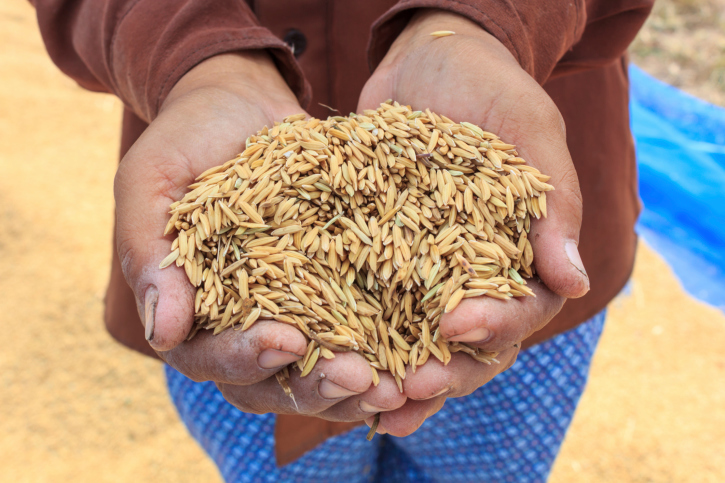Patrick Moore, chair and spokesman for Allow Golden Rice, discusses why he founded and ultimately left Greenpeace and how environmentalists are betraying the planet they claim to care about. Environment & Climate News Managing Editor H. Sterling Burnett conducted this interview after Moore’s speech at the Ninth International Conference on Climate Change in July 2014.
Burnett: What inspired you and others to found Greenpeace and defined its initial work?
Moore: As an undergrad in an Honors B.Sc. program in biology and forestry I did an experiment on the effect of ultrasound on the germination of corn seeds. The two variables were the amount of time the seeds were soaked in water before being subjected to ultrasound and the duration of the ultrasound exposure. I demonstrated it was possible to achieve faster germination and much faster initial growth with ultrasound exposure. My thesis for my Ph.D. in ecology at the University of British Columbia was on the impact of mine tailings disposal on the oceanography of a coastal fjord.
In 1971, while I was doing my Ph.D. I joined a small group named the Don’t Make a Wave Committee in Vancouver to help organize a protest voyage against U.S. hydrogen bomb testing in Alaska. We became Greenpeace, and I spent the next 15 years as a leader of the group as it grew from meeting in a church basement to a group with over $100 million coming in every year.
Burnett: What caused you to leave Greenpeace, and how did you become one of the most prominent spokespersons for a rational response to climate change?
Moore: I left Greenpeace because my fellow directors, none of whom had any formal science education, began to adopt policies I could not defend. The final straw was a proposal to “Ban Chlorine Worldwide.” I knew chlorine is the most important element for public health and medicine. They would not listen to me, so I had to leave after 15 years in the [organization’s] leadership.
I began to study the climate issue seriously in 1989, when I founded the British Columbia Carbon Project in response to a government study claiming the forest industry was the biggest emitter of carbon-dioxide. I knew most of the emissions from forestry were from biomass and should not be counted the same as fossil-fuel emissions, so I wrote an essay titled “Are all Carbon Atoms Created Equal?” I assembled a coalition of representatives from all sectors involved in the production, sequestration, and regulation of carbon-dioxide emissions. We showed transportation, not forestry, was the largest emitter.
I was skeptical of the claim of a direct cause/effect relationship between carbon dioxide and global temperature from the beginning. The historical record does not bear it out. I know the [UN’s Intergovernmental Panel on Climate Change, or IPCC] is hopelessly conflicted because their mandate is only to consider the human influence on climate, not the many natural variables causing climate changes down through the ages. Therefore, if the IPCC found humans are not the main cause, or if warming would be a good thing, there would be no reason for them to exist.
Burnett: What have you found to be the most disturbing aspect of the way climate research and climate policy have developed in recent years?
Moore: I am amazed even one person accepts the assertions “the science is settled” and “the evidence is in” when there is nothing to back this up. All they have is a hypothesis that if all else were equal there would be a slight warming from a doubling of carbon dioxide and a bunch of computer models that are proving hopeless at predicting actual trends in temperature.
How this amounts to anything being “settled” is beyond me. If there was actual scientific proof human emissions of carbon dioxide are now the main cause of global warming, someone would write it down on a piece of paper for all to see. It is conjecture at best, and even the IPCC uses the word “likely,” which is not a science word but rather refers to a judgment or opinion.
Burnett: What is the focus of your current research and efforts?
Moore: I formed the Allow Golden Rice Society to campaign for the acceptance of golden rice, a genetically modified rice variety containing beta-carotene, the precursor to vitamin A. About two million children die every year from vitamin A deficiency, mainly in Asia and Africa. This nutrient deficiency kills more children than any other cause, including malaria.
In 2014 we conducted three tours of European countries where the main opposition to golden rice is based, in particular at Greenpeace’s headquarters in Amsterdam and at the German Greenpeace office in Hamburg. We reached over 30 million people through the media with a positive message about golden rice. In March of this year we are conducting the Golden Rice Asian Tour, campaigning for golden rice in the Philippines, Bangladesh, and India.
In January 2015 I was appointed chair for Ecology, Energy, and Prosperity at the Frontier Centre for Public Policy in Canada. I will oversee original research in climate change, biotechnology, and energy. In the area of climate, I am particularly interested in demonstrating the lack of correlation between carbon dioxide and temperature through the ages, and the “ocean acidification” hoax. In biotechnology I will promote a “product-based” as opposed to a “process-based” regulatory system for novel crop varieties.






